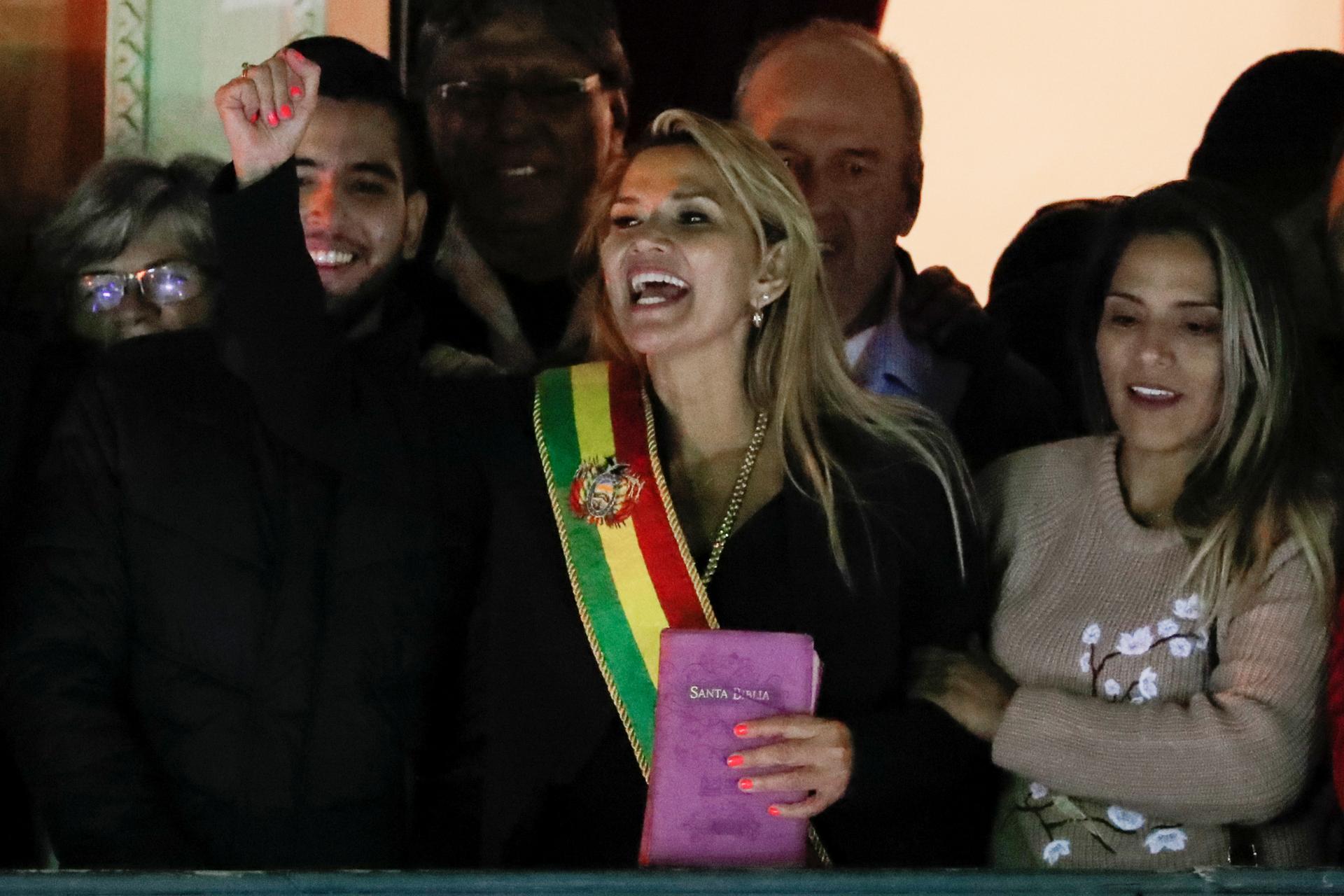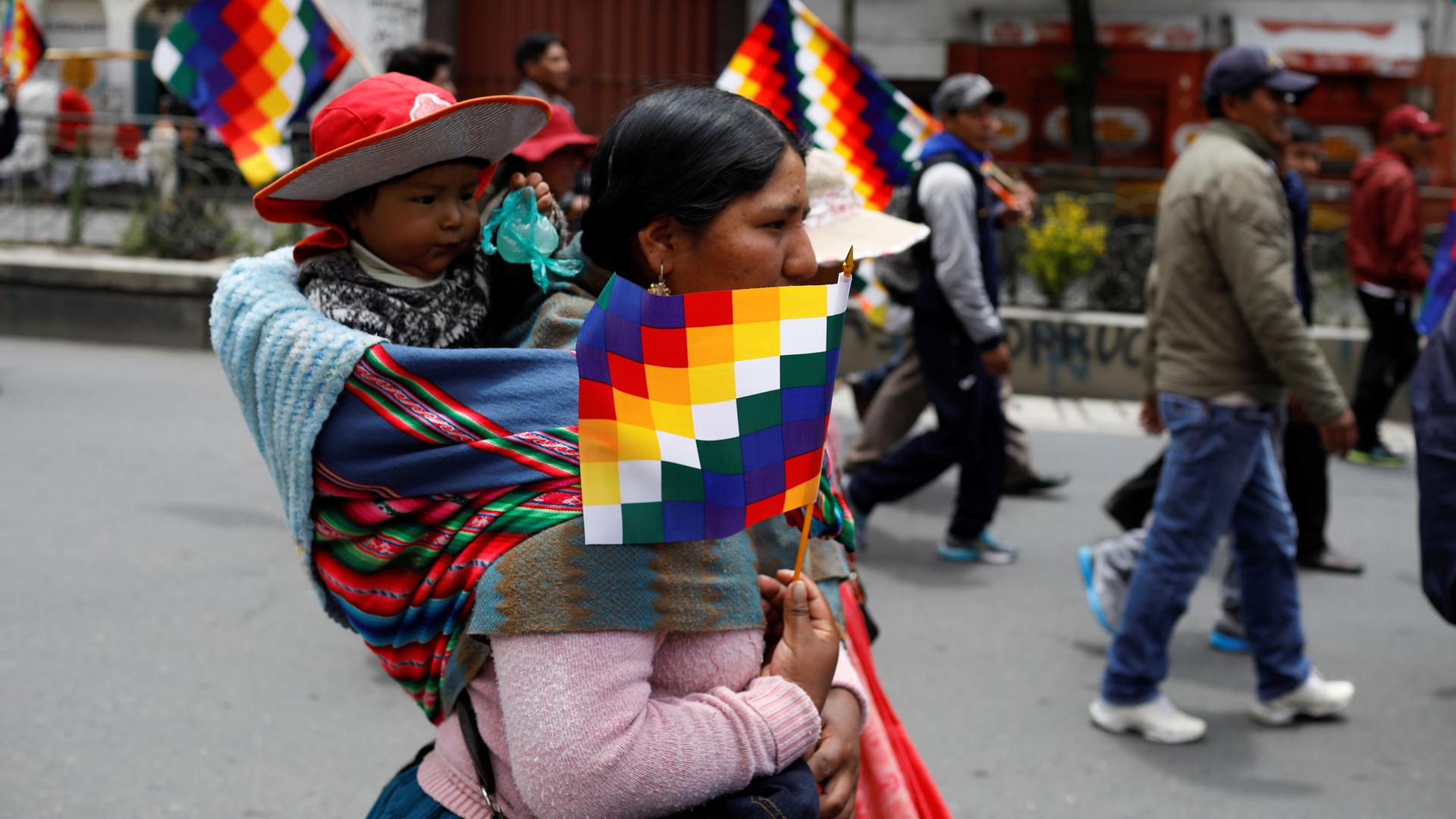Bolivia sees backlash against conservative interim leader
An indigenous woman holding a Wiphala flag carries a kid, in La Paz, Bolivia, on Nov. 13, 2019.
Sandra Puma marched toward the center of Bolivia’s capital of La Paz on Thursday with her six-month-old child strapped to her chest.
She was marching in a protest against Bolivia’s new interim president, her eyes stinging from the heavy rounds of tear gas shot by police to stop the crowd, which was several thousands strong, from reaching the presidential palace.
But Puma vowed to stay on the streets until interim president Jeanine Añez, a former senate vice president who declared herself Bolivia’s leader last week, steps down. Puma wanted former Bolivian President Evo Morales to be reinstated.
“This coup that they have staged against him is not fair. I’m here with my daughter, because thanks to Evo we have been doing well.”
“This coup that they have staged against him is not fair,” said Puma, who hails from El Alto, a working-class city perched high above La Paz, where thousands of young mothers like herself have benefited from subsidies created by Morales’ socialist government. “I’m here with my daughter, because thanks to Evo we have been doing well.”
Tensions in Bolivia have erupted in the turbulent days since Morales’ sudden resignation, killing nine in skirmishes between security forces and coca farmers loyal to the former president, a former coca farmer himself.
His supporters, many of them who hail from poorer or Indigenous communities, have taken to the streets and are blocking roads in an effort to reinstate Bolivia’s first Indigenous president. They want to restore a popular government that has drastically reduced poverty rates and has given the nation’s long-neglected Indigenous people a voice in national politics. Añez, by contrast, is a conservative Roman Catholic who declared herself president with a Bible in hand as she promised to call new elections. She has denied Morales’ ouster was a coup.
Critics see the backlash to Añez as a dangerous effort to bring back a president who they say worked hard to dismantle the nation’s democratic institutions and turn Bolivia into a one-party state.
“He changed a lot of laws to stay in power,” said Juan Martin Delgado, a youth leader who helped organize a 21-day strike in Santa Cruz, Bolivia’s largest city. “He subverted our institutions, and when we voted against his re-election, he completely ignored us.”

Morales resigned Nov. 10 after 13 years in power, during which he transformed the nation’s politics. His resignation followed weeks of massive protests over an election that his opponents and international monitors say was rigged. He is currently in exile in Mexico.
It wasn’t the first controversial election under Morales’ watch. In 2016, he lost a referendum on whether he could run for a fourth consecutive term. Morales appealed the result at a constitutional court packed with judges selected by his congressional allies and obtained a ruling that said that not allowing him to run for re-election would violate his human rights.
“That was practically a coup,” said Delgado, the youth leader.
Añez, whose claim to power is questioned by many, was named Bolivia’s interim president Tuesday after four officials who preceded her in the line of succession resigned. While Morales’ party, the Movement for Socialism, or MAS, has its base in Indigenous communities and poor urban areas in the west of Bolivia, Añez’s interim government is more popular with the middle class and among Bolivians of European descent. The latter ruled Bolivia since it was founded in the early 19th century, until Morales was elected in 2006.
His removal from power continues to spark protests. Food and gasoline are starting to become scarce in La Paz and other major cities as protesters block major highways.
Añez, whose seemingly racist tweets posted in 2013 have fueled some of the violence, has responded by deploying the military to control street protests. She has also issued a decree that exempts security forces from facing criminal charges if they injure or kill protesters in self-defense.
Human rights groups have widely criticized the move, while analysts have urged Añez to build bridges with the MAS party, which holds a two-thirds congressional majority.
“Negotiations will be necessary” to call off the protests, said Ericka Brockmann, a former Bolivian senator who is now a United Nations consultant. “The new government will have to use all means at its disposal to convince MAS, or at least some sectors of that party, to participate in the next elections.”
A call for dialogue
But experts question whether Añez is the best candidate to take that action.
“There are a lot of old wounds, that are once again surfacing in the current political crisis. And what we see is that political leaders are also trying to fuel these tensions.”
“There are a lot of old wounds, that are once again surfacing in the current political crisis,” said Jose Fuentes, a Catholic priest who has worked for 28 years in Bolivia and is now part of a committee trying to jumpstart talks between both sides. “And what we see is that political leaders are also trying to fuel these tensions.”
Añez said Friday that if Morales returned to Bolivia he would have to face prosecution over vote-rigging. But she has also tried to soothe tensions by stating that her own interim government would only last “months.” Her priority, she added, was to organize elections in which the MAS party could participate — though not Morales himself.
On Friday morning, Añez said at a press conference that her government would not touch the subsidies and other social benefit programs created by the Morales government.
But Añez has also taken actions that are widely seen as alienating Morales and his supporters. During her inauguration she walked into the presidential palace with a large bible in hand, saying that “God had finally” entered the building, a jive at the secular Morales, who inaugurated his presidential terms with Indigenous rituals at a famous archeological site.
Later in the week, Añez expelled more than 700 Cuban doctors from Bolivia, as well as diplomats from Venezuela’s socialist government, marking a radical shift from Morales’ foreign policy, which some argue goes beyond her mandate as caretaker-president.
In the streets of Bolivia, where opponents of Morales see him as a dictator in the making, and supporters see him as a champion of the poor, a few people are now starting to call for dialogue.
“We need to reach a deal were neither side feels belittled, or left behind,” said Daniela Zamorano, an archeology student who recently attended a small peace rally in La Paz, where demonstrators waved white flags. “Ultimately we all have to live in the same country.”
Our coverage reaches millions each week, but only a small fraction of listeners contribute to sustain our program. We still need 224 more people to donate $100 or $10/monthly to unlock our $67,000 match. Will you help us get there today?
